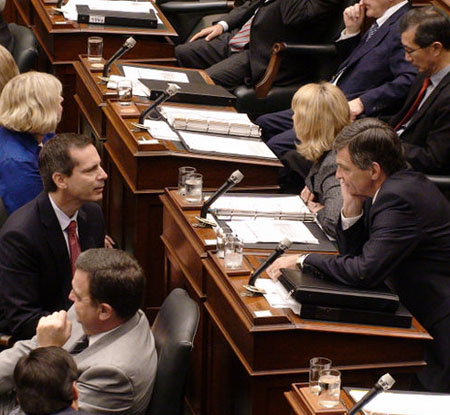How do Ontario gas plants stand up to Profumo scandal model?
Mar 2nd, 2013 | By Randall White | Category: Canadian Provinces
The 1989 movie Scandal offered a compelling portrayal of the 1963 Profumo Affair in the United Kingdom, which finally brought the Conservatives out and the Labour Party in to the government at Westminster. What lessons does a new book on the same subject suggest for the current gas plant controversy in the old outpost of the British empire in Canada’s most populous province today?
A week or so ago Heather Mallick at the Toronto Star published a passionate defence of “British novelist Hilary Mantel’s elegant writing on Princess Kate” – which had been “viciously attacked” by various individuals and organizations in the United Kingdom. Ms Mantel’s writing had appeared, online and then in print, in the London Review of Books, which Ms Mallick calls “the best literary and political magazine in existence.”
Like Heather Mallick I subscribe to the London Review of Books. I received my latest number in the mail – the one that included Hilary Mantel’s essay on”Royal Bodies” – at about the same time as my local Ontariario media were touting such headlines as “Kathleen Wynne rejects Tory calls for inquiry into gas plant cancellations” ; “Ontario premier rejects public inquiry into cancelled gas plants” ; “No inquiry needed to probe gas plant boondoggle: Cohn” ; “Wynne won’t blame McGuinty for scrapped gas plants scandal” ; and “Wynne admits scrapping gas plants was ‘political decision’.”
(The Tim Hudak Conservatives in Ontario provincial politics, that is to say, seem to have decided that one of their better hopes of engineering a spring/summer election, which will return them to their rightful position as natural rulers of Canada’s most populous province, is to flail away at the so-called gas plant scandal. In which the governing “McGuinty-Wynne” Liberals – as the Tories are saying – cancelled two unpopular Greater Toronto Area gas plant projects, one in the midst of the last election campaign, at some still unclear expense to taxpayers!)
The 21 February 2013 London Review of Books has brought fresh food for my own thoughts about the so-called gas plant scandal, here in the old Ontario outpost of the old global empire on which the sun never dared to set. Right after Hilary Mantel’s elegant writing on Princess Kate, it includes an even more fascinating review of a new book about the so-called Profumo Affair of the 1960s in the UK. This is arguably the current textbook or model political scandal in the Westminster tradition of parliamentary democracy, to which Australia, Canada, India, Ontario, and quite a few other places still more or less subscribe.
More exactly, the book under review is An English Affair: Sex, Class and Power in the Age of Profumo by Richard Davenport-Hines – “a British historian and literary biographer, best known for his biography of the poet W. H. Auden.” Davenport-Hines has also “headed a research project on the globalisation of pharmaceutical companies,” and written such other books as The Pursuit of Oblivion: A global history of narcotics 1500-2000. The reviewer is David Runciman – “a British political scientist who teaches political theory at Cambridge University,” descends from the old aristocratic English ruling class, and is the great nephew of the historian Steven Runciman (a schoolboy friend of George Orwell’s at Eton College).
I think the Profumo Affair, which ran its effective course in 1963, is a useful lens through which to view the Ontario “gas plant boondoggle,” which the opposition parties and especially the Hudak Conservatives are apparently trying to turn into a major political scandal in the Great Lakes region of North America some 50 years later. It compares our current local peccadilloes with the (or at least a)Â model Westminster-tradition scandal since the Second World War.
(And note that an early 20th century Ontario Conservative government invented what still passes for the province’s official motto – “Ut incepit Fidelis sic permanet” or “Loyal she began, loyal she remains,” where the key object of loyalty today is presumably the British or Westminster political tradition.)
Even more importantly, the Profumo Affair had a lot to do with sex, and featured a scion of the celebrated Anglo-American Astor family, a Second World War hero, Russian spies, and at least two beautiful women, Christine Keeler and Mandy Rice-Davies. This side of things was compellingly brought out in an excellent 1989 movie, simply but aptly called Scandal. And, perhaps most important of all, comparing our allegedly scandalous local Ontario scene today with the Profumo scandal, in the Mother of Parliaments a half century ago, is the only way I can see of making the 2013Â Ontario “gas plant boondoggle” more interesting than an afternoon nap.
Seven Steps to Heaven : David Runciman’s key quotations on the Profumo model
As I look again at David Runciman’s review of Richard Davenport-Hines’s new book on the Profumo Affair of 1963, I seem to have marked up seven key passages or quotations. It is not entirely unfair, I think, to suggest that, taken together, these quotations more or less summarize some kind of Profumo model of high-order political scandal in parliamentary democracies (and note that I have added italics in some places myself, to, as it were, further summarize the summary)Â :

According to someone known as T. Stokes, Lord William, 3rd viscount Astor, held “sex and black magic parties at his grand house, where Christine Keeler and Mandy Rice-Davies seduced the rich and famous.”
(1) WITCH HUNTS. “Witch hunts don’t make people behave better; on the whole, they make them behave worse. Davenport-Hines … mocks the most celebrated moment of the whole saga, when Mandy Rice-Davies responded to being told that Bill Astor had denied having had sex with her with the line: ‘Well, he would, wouldn’t he?’ Ever since, worldly commentators have taken this to be a glimmer of straight-talk amid the welter of lies. In a recent article in the Times, Daniel Finkelstein held it up as a watershed in modern political analysis, the moment when someone finally pointed out that public figures are as self-interested as the rest of us. The only trouble is that all the evidence suggests Astor was telling the truth, and Rice-Davies was lying …”
(2) NEVER REFORMED. “Neither does Davenport-Hines have much time for the other redemptive story that is often told about the affair: the penance done by Profumo himself. After his resignation, he withdrew from public life and devoted himself to charity. He went to offer his services to Toynbee Hall in the East End of London … His obituary in the Daily Telegraph in 2006 announced: ‘No one in public life ever did more to atone for his sins … Davenport-Hines accepts that Profumo deserved to be rehabilitated, as indeed he was: his return to favour was championed by the Queen Mother, who hosted dinners in his honour towards the end of his life. But … on one of these occasions, seated between his hostess and a 17-year-old Guinness heiress, ‘the old satyr whispered to the latter during the first course: “Ever been fucked by a seventy-year-old? No? You should try it.” Profumo may have been chastened by his experiences, but he was never reformed …’”
(3) REAL QUESTION. “In conventional accounts of the Profumo affair the government’s fatal error occurred the night before Profumo made his denial to the Commons, when he was summoned from his bed by panicked ministers demanding that he set the record straight. One of them, Iain Macleod, put it bluntly. ‘Look, Jack,’ he said, ‘the basic question is: did you fuck her?’ Profumo said no, and his interrogators said they believed him. But that wasn’t really the question. The meeting had been called because the government was spooked by Labour suggestions that Profumo had committed some sort of security breach.” [P btw was at the time “secretary of state for war”.]
(4) COCK-UP NOT CONSPIRACY. “Why did Brooke unleash all this thuggery? The conspiracy theory says that he and others had decided the only way to hush up what threatened to become a national security scandal was to turn it into a sex scandal: they wanted the facts about Profumo’s little lie to come out, so as to throw the public off the scent of the much bigger lies … Nailing Ward as a pimp, and Profumo as an adulterer, was much better than allowing MI5’s dirty linen to be washed in public. The cock-up theory says that Brooke was fed up with all the nastiness swirling around the government and wanted to make an example of someone. He simply didn’t think about the consequences. When things go wrong in politics it’s usually cock-up, not conspiracy.”
(5) ROLE OF MASS MEDIA. “The press, once the lid was lifted, went after the story with everything at their disposal: editorial writers took the high ground, castigating Astor, Ward and Profumo for their depravity; feature writers recounted in as much detail as they could muster just what this depravity consisted in; reporters routinely broke the law to provide any shred of evidence that might back them up. Anyone who thinks the recent antics of the press are uniquely shocking should read this book. Ward’s cottage on the Astor estate was broken into. His friends were bribed to spill the beans … Profumo was pursued remorselessly, along with his wife and eight-year-old son. The police didn’t just turn a blind eye to all this; they connived in it.”
(6) CAREER ADVANCEMENT. “Two days before Macmillan resigned on 18 October 1963, another ageing political leader stepped down. Konrad Adenauer, the 87-year-old West German chancellor, finally called it a day, his authority having been undermined over the previous year by the effects of the Spiegel affair …  Adenauer’s defence minister, Franz Josef Strauss, had authorised a police raid on the offices of Der Spiegel … charging them with security breaches for publishing a highly critical article about his management of the West German military … The press had a field day, and so did Adenauer’s political opponents. Power-starved politicians and embittered journalists used the scandal to advance their own careers, The outs got in; the ins were temporarily put out. Davenport-Hines complains of the Profumo affair that its result was for ‘one network of egotists, with an intricate history of mutual obligations, murky pacts and tacit promises [to be] replaced by an opposing alliance, no more qualified or efficient, held together by similar bargains, ambition and vanity’. There is nothing distinctively English about this. It’s how democracy works.”
(7) VEHICLE OF DEMOCRATIC CHANGE? “In many countries, the political class that produced the postwar settlement was still hanging on; old political soldiers were refusing to die. Governments that had been around too long were growing careless, and their publics were looking for something new. These are the circumstances in which scandal becomes a vehicle of democratic change. The result is usually disappointing: change is never commensurate with the scale of the outrage a scandal provokes. But it is effective: scandals are a good way of telling entrenched political elites when their time is up. The Profumo affair is simply an egregious example of a familiar tale. Democracies (especially parliamentary democracies) run on cycles of tolerance and intolerance for indiscretion at the top. New governments get away with a lot, but they are also more alert to what they can get away with. Then, when they become old, they become less alert and they get away with less. The ability of a scandal to destroy a government usually has very little to do with the merits of the case. It depends on timing. It is asking too much to expect democracies to acquire a sense of proportion about these things.”
How does the Ontario “gas plant boondoggle” stack up against the Profumo model?
There are no doubt various ways in which one might use this seven-point Profumo model of political scandal to evaluate or otherwise assess the current Ontario “gas plant boondoggle.” A few hasty remarks under each of the seven points will probably do the trick well enough for any sensible purposes here:

Premier Dalton McGuinty, left, and Energy Minister Chris Bentley chat Oct. 2, 2012, moments before opposition MPPs voted to send Bentley before a legislative committee for contempt. (Jonathan Jenkins/Toronto Sun).
(1) WITCH HUNTS. The opposition parties’ passion to investigate the former McGuinty government’s cancellation of two unpopular gas plant projects in the Greater Toronto Area has involved at least one altogether overblown witch hunt. See, eg: “Chris Bentley could face jail if found in contempt of parliament … Energy Minister Chris Bentley faces a historic punishment – or even jail time – after opposition MPPs used their majority in the legislature to ram through a motion to probe the $230 million in cancelled power plants.” In a bow to the parallel notion that the people who are really lying are often the people who claim to be telling the truth the loudest, Chris Bentley was not even energy minister when the gas plants were cancelled. Moreover:”Bentley had widely been seen as Premier Dalton McGuinty’s heir apparent but … ten days after McGuinty announced his resignation, Bentley announced that … he too would be leaving politics. Bentley resigned his seat in the legislature effective February 14, 2013.” If there were an award for person most unjustly treated in this alleged Ontario political scandal so far, Chris Bentley would almost certainly be the leading candidate.

The real John Profumo, and his wife, former actress Valerie Hobson, who stayed with him despite his affair with Christine Keeler, back in the day.
(2) NEVER REFORMED. The Profumo model proposition that the prime mover in a political scandal may be “chastened” but is “never reformed” starts to test the Ontario gas plant boondoggle in very arduous ways. The key question here is who is/was Profumo in the current Ontario case? If Chris Bentley wasn’t the energy minister responsible at the time the deed was done, who was? The formal answer is one Brad Duguid (currently Minister of Training, Colleges and Universities in Premier Wynne’s new cabinet). But, as CBC News reported back on October 5, 2012 : “Last month, the government released 36,000 pages of documents on the cancelled plants to comply with a Speaker’s ruling, but there were no communications signed by Duguid…. That prompted the Progressive Conservatives to claim the energy minister had been cut out of the decision to cancel the Oakville plant by the premiers’ office, something Duguid flatly denied … The decision to cancel the Mississauga gas plant was made by the Liberal campaign team.” You could say that all this casts former Premier McGuinty himself in the Profumo part. And Premier McGuinty did announce his resignation on October 15, 2012 – in a context in which the gas plant controversy at least figured in a significant way. (And can anyone seriously imagine that Dalton McGuinty will ever eventually ask some 17-year-old heiress, at a lunch in Ottawa hosted by the Governor-General’s mother, “Ever been fucked by a seventy-year-old?”)

Christine Keeler, right, and Mandy Rice-Davies on the way to the trial of Dr Stephen Ward. Photo: AP.
(3) REAL QUESTION. The early 21st century gas plant controversy in Ontario suffers from a fundamental lack of clarity over just what the basic question actually is. It can’t be whether the Oakville and Mississauga gas plant projects should have been cancelled, since all three parties in the Legislative Assembly have agreed that they should have been. It is similarly jejune at best to object that the projects were cancelled for “political” reasons – “to save the seats of five Grit MPPs in Oakville and Mississauga” in the 2011 election. As David Runciman puts this point in another of his seven steps, that is just “how democracy works.” Opposition parties and other critics flailing about for something more plausible have latched onto the question of the costs involved in cancelling the projects – variously estimated by various sources at anywhere from $230 million to $1.3 billion. Yet, even here, are either the Conservatives or the New Democrats prepared to say that if governments led by them had discovered the costs of cancelling the projects were too high, they would have let the projects go ahead? The most sensible basic questions have probably been suggested most recently by new Premier Wynne herself, as she struggles to deal with the legacies of the now resigned Premier McGuinty : why was the (wrong) decision to put the plants in Oakville and Mississauga made in the first place, and how can we ensure that such wrong decisions aren’t made again? Alas, this kind of question is not going to be very much fun for the opposition parties or almost anyone else.
(4) COCK-UP NOT CONSPIRACY. In another effort to isolate a sensible basic question opposition parties and other critics have sometimes urged that the real offence of the McGuinty Liberal government was not the decision to cancel the two gas plant projects, but what amounts to a conspiracy to cover up the essentially political or even corrupt process by which the decision was made. (Thus all the fuss about how many documents have been released when and so forth, the latest phase of which unfolded just last week : see “Liberals slip on Project Banana peel as more power plant documents surface.”) Yet this quickly bumps into the Runciman/Profumo model proposition that When things go wrong in politics it’s usually cock-up, not conspiracy. And Martin Regg Cohn at the Toronto Star recently focused on this side of the story: “Are we seeking evidence of a government coverup? The Ontario Power Authority released 30,000 pages last September and another 26,000 in October after expanding the search terms. When the OPA dumped 600 more pages of irrelevancies last week, MPPs screamed ‘coverup.’ Seems more like political death by 56,600 paper cuts thanks to incompetence, not conspiracies.”
(5) ROLE OF MASS MEDIA. The current Ontario example of journalists like Cohn may seem to contradict the the Runciman/Profumo model proposition alluded to in : Anyone who thinks the recent antics of the press are uniquely shocking should read this book. And it probably is true enough that another flaw in what Cohn has also more aptly christened the current Ontario “gas plant boondoggle” is that the regional media have not more or less universally piled on to the opposition parties’ frequently overblown narrative. At the same time, another recent report in the Toronto Star suggests that the media does have its own self-interest in aiding and abetting a story line that attracts readers : “Wynne admits scrapping gas plants was ‘political decision’… Premier Kathleen Wynne promises more documents to come on decision to cancel gas plants in Oakville and Mississauga before the 2011 election … ‘There is an admission there are more documents,’ added Progressive Conservative MPP Vic Fedeli (Nipissing), his party’s energy critic … With some critics claiming the cancellations cost taxpayers as much as $1.3 billion, Fedeli said more documents will help get ‘to the bottom of this cover-up and to the price’ … Conservative House Leader Jim Wilson said his party would “take seriously [Premier Wynne’s] offer.” … “I just hope this isn’t the beginning of the cover-up of the cover-up of the cover-up.” (And yet, as noted above, as long ago as last October the press was reporting that the “decision to cancel the Mississauga gas plant was made by the Liberal campaign team” : so it has long enough been admitted by everyone involved that “scrapping gas plants was ‘political decision’.” And if you watched the actual Premier Wynne press conference on which this recent Toronto Star report was based yourself, you could easily enough see how the media is trying to spin its own provocative story, rather than report on what the premier has to say in some essentially neutral way.)
(6) CAREER ADVANCEMENT. David Runciman urges that in both the 1963 Profumo Affair in the UK and Konrad Adenhauer’s 1963 resignation in West Germany, you can see how : ”Power-starved politicians and embittered journalists used the scandal to advance their own careers.” My own sense at least is that enough of this has also gone on in the current Ontario gas plant cancellation controversy to have a disproportionate influence on public opinion. Last week, eg, “a new Forum Research poll found 57 per cent of Ontarians want … a probe to get to the bottom of the gas plant closures … Only 22 per cent disagreed with the need for a judicial investigation and 20 per cent didn’t know.” Respondents to such polls, I think it is fair to say, react to the general tone of reports in the media – not to any careful assessment of the details of the case, which are confusing at best even to those few paying close attention. And there is of course enough justification for voters to entertain a healthy general scepticism about almost all comings and goings in the real world of politics – even or perhaps especially in real-world democracies.
(7) VEHICLE OF DEMOCRATIC CHANGE? So (as our new Premier Wynne herself might say) … does the current Ontario gas plant controversy finally qualify as what David Runciman’s Profumo model calls “a vehicle of democratic change”? And what about his concluding propositions : “The ability of a scandal to destroy a government usually has very little to do with the merits of the case. It depends on timing. It is asking too much to expect democracies to acquire a sense of proportion about these things.” The objective answer here is of course that only time can and will tell. My own subjective impulse at the moment is to side with Martin Regg Cohn’s scepticism about the ultimate sharpness of the current Ontario “gas plant boondoggle”’s cutting edge. To me neither the Conservatives nor the New Democrats have (yet?) shown that they are in a better position to govern effectively than Premier Kathleen’s new Liberal government. (And personally I grew up in an Ontario in which a so-called Progressive Conservative party ruled without interruption from the time I was born to my 40th birthday: the thought that a Liberal or generally progressive party, or combination of co-operating parties, might now repeat this stunt in an opposite ideological direction, in some degree, does not really bother me.) I finally feel as well that David Runciman’s subjective conclusion about how it “is asking too much to expect democracies to acquire a sense of proportion about these things” probably has a little too much to do with his old world aristocratic ancestry. Those ardent democrats among us from humbler new world backgrounds (and I must confess that I qualify myself under this heading) have a right to expect a little more.










